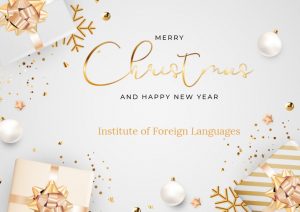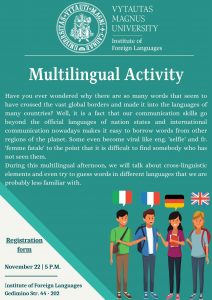MERRY CHRISTMAS AND HAPPY NEW YEAR!
Multilingual Advent Calendar of VMU IFL
Happy Thanksgiving!
 Today, on November 25th, Thanksgiving is celebrated in the United States. The deep tradition of this celebration is to share gratitude with the loved ones, family, friends, or colleagues.
Today, on November 25th, Thanksgiving is celebrated in the United States. The deep tradition of this celebration is to share gratitude with the loved ones, family, friends, or colleagues.Multilingual Activity
Happy International Teachers’ Day!
Happy International Teachers’ Day!
We wish you fulfillment in your daily activities, lots of joy in your calling
and immeasurable patience!
Transform4Europe presents: the European Day of Languages 2021
Initiated by the Council of Europe in 2001, the European Day of Languages on the 26th of September has become a symbol of promoting and celebrating linguistic and cultural diversity of Europe as one of its fundamental values and assets. Multilingualism has also been declared as a value by the partners of the Transform4Europe alliance which aims at educating future European knowledge-entrepreneurs who are well-equipped with plurilingual and intercultural competences and are well-prepared to make transformations for a more inclusive Europe.
The Transform4Europe Alliance invites you to celebrate the 20th anniversary of the European Day of Languages on the 24th of September together. With this initiative we wish to promote multilingualism and language learning as an inevitable component of HE in Europe, raise awareness among the communities of all partner universities about the languages of the Transform4Europe alliance and engage the communities of all partner universities and their stakeholders in a discussion of the benefits and challenges that linguistic diversity brings into the European corporate, public and academic discourses.
During the event short introductory language tasters of 8 Alliance languages: Bulgarian, Catalan, Estonian, German, Italian, Lithuanian, Polish and Spanish, including survival phrases, interesting facts, cross-linguistic comparisons, etc. will be presented. Representatives of international companies and organizations will deliver presentations on intercultural and plurilingual (mis)communication in corporate and public discourse. Presentations will be given in English, German, Italian and Spanish and will focus on language needs in the contemporary corporate and public life, cases of miscommunication, challenges encountered, solutions found and examples of good practices.
The preliminary programme of the online event on the 24th of September:
09:30 – 09:45 Opening of the event.
09:45 – 10:30 Transform4Europe Language Tasters – short introductory presentations about the languages of the alliance including survival phrases, interesting facts, cross-linguistic comparisons, etc.
10:30 – 11:30 Intercultural and plurilingual (mis)communication in corporate/ public discourse – presentations by representatives of international companies and organizations.
We are kindly inviting you to participate in the event, receive positive impressions, promote multilingualism across Europe and raise awareness about the importance of languages/multilingualism in the contemporary world. The registration is open till 22nd of September. Please register here: Registration
SM2021 Conference Programme
We are pleased to announce that the final programme for the Sustainable Multilingualism Conference 2021
is now available online: http://bit.ly/SM2021programme
All non-presenting participants can still register by filling the registration form until May 31.
Registration: http://bit.ly/SM2021reg
Moments from the first student language conference “Let’s grow together”
The first student language conference organized by the Foreign Language Institute at Vytautas Magnus University “Let’s grow together” took place on April 29th, 2021. During the first online conference, 26 students presented in English (B1-C2 level), and one student offered a presentation in Italian. Since the Foreign Language Institute’s mission is to develop multilingual competencies, the hope remains that after this event, students will gain more courage to present in a greater variety of languages offered in the upcoming conferences. Overall, the conference attracted over 180 listeners to the plenary discussion and almost 600 listeners to students’ presentations in seven various sections.
Vaida Misevičiūtė, the initiator of the student language conference, opened the conference and gave a welcome speech in a “bouquet” of various languages. In the plenary discussion, Vilma Bijeikienė, Vice-Rector for Communication at Vytautas Magnus University, Teresė Ringailienė, Director of IFL, and Žieda Tamašauskaitė, lecturer in Finnish and English, shared their insights on language learning. The discussion was dominated by a warm and playful atmosphere. The students were encouraged to enjoy their language competencies and nurture them throughout their lives as languages help people become unique representatives of their profession. The importance to make full use of the opportunities to communicate in other languages even if with mistakes was stressed as one way that guarantees language proficiency. Following the plenary discussion, the students separated into various sections.
The sections “Issues in Education” and “Concerns in Elementary Education” (moderator – IFL lecturer Vaida Misevičiūtė) covered issues relevant not only to the future teachers, but lifelong learners. It should be noted that in this section students did not read presentations, but spoke to the audience with passion and professionalism. The structure of the presentations, the depth, and academic vocabulary use were very pleasing. Students covered such areas as time management, emotional intelligence, and reading. The sections “Physical and Psychological Challenges in Modern Society” and “Current Issues in Today’s World“(moderator – IFL lecturer Aušra Jankauskaitė) delt with physical and psychological health issues arising from an overly sedentary lifestyle, as well as the Covid-19 pandemic. These sections of the conference reflected the internationality of VMU students with student presenters from Sakartvelo, Kazakhstan, and Belarus. The fact further stressed the important role English plays as a universal language of knowledge sharing. Other two sections “Students’ Issues Studies & Work Opportunities” and “Insights into Economics” (moderator — IFL lecturer Ilona Kildienė) contained the majority of lower level students who showed high academic competency for this level. Presenters discussed the advantages and disadvantages of distance learning, features of various economic models, career building techniques in Lithuania, and shared success stories in business touching upon the skills that will be attractive and relevant for the future employment. The last but not least, the section on “Cross Cultural Communication” (moderated in English and Italian by Dr. Jurgita Macijauskaitė-Bonda) attracted many curious listeners. One presenter revealed foreign students’ perception about Lithuania and Lithuanians, another focused on the prevailing stereotypes about Scandinavians, and the discussion was followed by the importance of the effective intercultural communication. This section was completed by a report in Italian on the teaching of Italian as a foreign language to children. For many speakers, this conference was the first experience of speaking to a large audience, but youthful enthusiasm and a desire to experience something new overcame fear. Each journey begins with the first step. When embarking on a language journey, perhaps the most important thing is to fulfill the common goal: to grow and improve together, and this student language conference was a suitable and motivating space for that.
Moments of the Plenary Discussion:
Recordings of three Parallel Sessions (modified):
European survey on the place of family languages at school / Enquête européenne sur la place des langues familiales à l’école
The RECOLANG team (Resources for assessing the home language competences of migrant pupils) is carrying out a European survey on the place of family languages at school, particularly within different education programmes or curricula involving migrant adolescents aged 11-18.
This survey focuses on the practices of assessing home language skills and their role in different European education systems. More detailed information on the survey can be found below.
The survey is made up of two complementary sections aimed at two different target audiences:
- A section aimed at pupils aged between 11 and 18 (or their families), who are from a migrant background and one or more family languages other than the language(s) of the school. This section is available in Arabic, English, French, German, Persian (Dari/Farsi), Hungarian, Portuguese and Turkish: https://surveyforlearners.questionpro.com
- A section for schools and educational institutions, teaching and supervisory staff in schools, reception centres and organisations involved in initial and further professional development of teachers working with this age group (11-18 years). This section is available in English, French, German, Hungarian and Portuguese: https://enqueteinstitutionseducatives.questionpro.com
The survey will be online until the end of 2021. We would be very grateful if you could participate in this survey and disseminate it as widely as possible through your professional networks to anyone who might be interested in this project.
Further information :
This survey will provide a better understanding of:
- whether and how pupils’ languages and cultures are taken into account at school, and for what educational purpose (in relation to learner progress or to teacher professional development);
- how all language skills and their uses can be recognised in relation to learner progress or to teacher professional development.
This survey is based on numerous research studies which show the importance of taking account of all the languages young people bring with them to school.
Research on plurilingual competence shows us that learning a language (the language of schooling, for example) builds on the other (varieties of) languages that an individual (child, adolescent, adult) has at his or her disposal, in his or her repertoire.
Your opinion on these issues is important. By giving your opinion and sharing your experience, you will be contributing to the debate on integration and education issues related to bi/multilingual audiences, particularly migrants.
Based on the results of this survey, a collaborative workshop with representatives of the European countries involved in the project will provide an opportunity to analyse whether and how home languages are taken into account in the different education systems. This analysis will enable us to reflect on the conditions to be taken into account for formative assessment (adapted to the audiences concerned) of pupils’ home language skills.
The results of the survey and the collaborative workshop will make it possible to:
- cooperate in formulating recommendations for European education policy;
- contribute to improving the quality of European education systems and programmes for all pupils.
——————————————-
L’équipe RECOLANG (Ressources pour l’évaluation des compétences en langues familiales des élèves migrants) mène une enquête européenne sur la place des langues familiales à l’école, notamment dans les parcours scolaires des adolescents migrants entre 11 et 18 ans.
Cette enquête porte sur les pratiques d’évaluation des compétences en langues familiales et leur rôle dans les différents systèmes éducatifs européens. Vous trouverez des informations plus détaillées ci-dessous.
L’enquête est constituée de deux volets complémentaires à destination de deux publics-cibles :
- Un volet destiné aux élèves âgés de 11 à 18 ans (ou leur famille), ayant une histoire de migration et une ou plusieurs langues familiales d’usage autres que la/les langue(s) de l’école. Ce volet est disponible en allemand, anglais, arabe, français, persan (dari/farsi), hongrois, portugais et turc : https://surveyforlearners.questionpro.com
- Un volet à destination des institutions scolaires et éducatives, équipes enseignantes et d’encadrement des établissements scolaires, d’accueil et de formation initiale et continue des enseignants travaillant avec ce groupe d’âge (11-18 ans). Ce volet est disponible en allemand, anglais, français, hongrois et portugais : https://enqueteinstitutionseducatives.questionpro.com
L’enquête sera en ligne jusqu’à fin 2021. Nous vous serions très reconnaissants de bien vouloir y participer et de la diffuser le plus largement possible dans vos réseaux professionnels auprès de toute personne susceptible d’être intéressée par ce projet.
Plus d’informations :
Cette enquête permettra de mieux comprendre :
- si et comment sont prises en compte les langues et cultures des élèves à l’école, et dans quel but éducatif (en relation avec les progrès de l’apprenant ou le développement professionnel de l’enseignant) ;
- comment toutes les compétences langagières et leurs usages peuvent être reconnus dans les progrès de l’apprenant ou le développement professionnel de l’enseignant.
Cette enquête s’appuie sur de nombreux travaux de recherche qui montrent l’importance de la prise en compte dans les parcours du jeune des compétences langagières construites en dehors du cadre scolaire.
Dans la continuité des recherches sur la compétence plurilingue, on sait désormais que l’apprentissage d’une langue (la langue de l’école par exemple) se construit en s’appuyant sur les autres (variétés de) langues qu’un individu (enfant, adolescent, adulte) a à sa disposition, dans son répertoire.
Votre avis sur ces questions est important. En le formulant, en témoignant de votre expérience, vous contribuerez à la réflexion autour des questions d’accueil et d’éducation liées aux publics bi/plurilingues, notamment migrants.
En s’appuyant notamment sur les résultats de cette enquête, un atelier collaboratif avec différents représentants des pays européens membres du projet permettra d’analyser si et comment sont prises en compte les langues familiales dans les différents systèmes éducatifs. Cette analyse nous permettra de réfléchir sur les conditions à prendre en compte pour une évaluation à visée formative (adaptée aux publics concernés) des compétences en langues familiales des élèves.
Les résultats de l’enquête et de cet atelier collaboratif permettront de :
- coopérer à des formulations de recommandations pour les politiques éducatives ;
- contribuer ainsi à améliorer la qualité des systèmes et programmes éducatifs européens en faveur de tous les élèves.
Intensive English Summer Course 2021
- Activate your English A1-A2: intensive semester course
- Activate your English A2-B1: intensive semester course
- Activate your English B1-B2: intensive semester course
- Alumni
- Conference
- Conferences
- Courses
- Home
- IFL Research Cluster
- İngilizce Hazırlık Kursu “English Prep-Course”
- Language learning
- News
- Research
- Scientific Journal “Sustainable Multilingualism”
- Students
- Подготовительный курс английского языка “English Prep-Course”
- About us
- Contacts




















